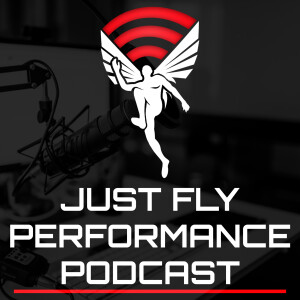
181: Tyler Yearby and Michael Zweifel on Creating Robust Athletes in the Weight Room Through Variability and Creative Movement | Sponsored by SimpliFaster
 2019-12-19
2019-12-19
Download
Right click and do "save link as"
Today’s episode features Tyler Yearby and Michael Zweifel.
Tyler Yearby is a Former Strength & Conditioning Coach at Northeastern State University and the University of Minnesota, Twin Cities who has delivered over 200 domestic & international continuing education courses, workshops, and conference presentations in 12 countries. Tyler has, and continues to work with athletes ranging from youth to professional. Michael Zweifel is the owner and head of sports performance for “Building Better Athletes” performance center in Dubuque, Iowa. Michael has been on a number of previous Just Fly Performance Podcast episodes, focusing largely on the development of reactive agility and transferable sport movement. Tyler and Michael are both a part of “Emergence” which is a movement skill education company.
When it comes to building athletes in the agility and change of direction space, attitudes are changing and coaches are realizing how important it is to teach perception and decision making in a variety of situations, to eventually transfer better to sport. Agility done for the sake of running through cones as fast as possible is very limited in what it can do for an athlete in a chaotic sport environment, and podcast #76 was the epitome of that information.
Today’s show takes those same ideas of reactivity and creative movement, and puts it into the structure of the weight room: resistance training and plyometric exercises. Tyler and Michael try to mirror their approach to an “athlete based” model of problem solving throughout an entire program, and in this episode they share how creative means are utilized in the weight room to not only improve movement and robustness, but also stoke the fires of athlete creativity. On the show today, we dig into what these sequences look like, and get to the core of “athlete centered” training in the weight room on the level of variability, and much more.
Today’s episode is brought to you by SimpliFaster, supplier of high-end athletic development tools, such as the Freelap timing system, kBox, Sprint 1080, and more.
Key Points
What the motor learning concept of “repetition without repetition” means on a basic level
How Michael and Tyler are using motor learning and “repetition without repetition” principles in the weightroom
What a typical “repetition without repetition” weightroom training sequence would look like in the pre-season training period
What “athlete centered” training and coaching looks like
How ideas on variability affect plyometric and reactive training
How to adjust training variability based on an athlete’s readiness
“Repetition without repetition is not the means to solving a given motor problem, but the process of that solution. It is the changing and improving from rep to rep and the means of that, so everything essentially slightly changes as we perform any type of motor action” Yearby
“We view sport as a problem solving activity… we view the weightroom as assistive to this problem solving activity” Zweifel
“(In regards of variables to change from set to set) One (variation) is tempo, the other is stance” Yearby
“(Regarding lifting in awkward positions) Don’t our athletes need to be able to express force, despite the compromised positions they find themselves in the field?” Zweifel
“The learning centered approach doesn’t mean that you let the athlete do whatever they want” Yearby
“For me personally, in my athletes, I’ll gladly take a 20% weight reduction in a compound lift to have on this repetition without repetition scheme (different types of repetitions each set or rep)” Zweifel
“My athletes have given me a ton of feedback that me allowing them to explore in the weightroom, to be creative, and to own their own movements in the weightroom, have given them the confidence to do the same things out in the field” Zweifel
“For an initial starting point,
view more
More Episodes
012345678910111213141516171819
Create your
podcast in
minutes
- Full-featured podcast site
- Unlimited storage and bandwidth
- Comprehensive podcast stats
- Distribute to Apple Podcasts, Spotify, and more
- Make money with your podcast
It is Free
- Privacy Policy
- Cookie Policy
- Terms of Use
- Consent Preferences
- Copyright © 2015-2024 Podbean.com





